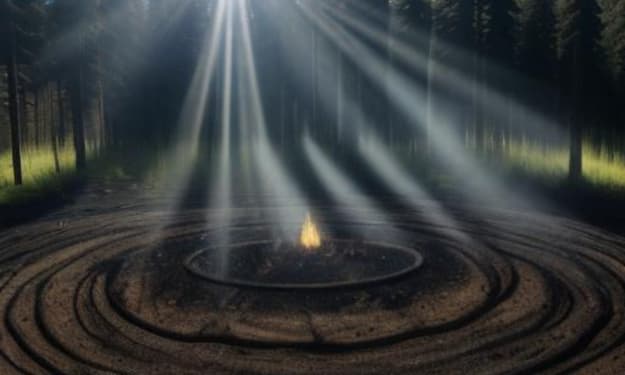
Playing with my locket, tracing my fingers over the outline of the heart shape, I realize today is three hundred and eighty-two days.
It’s been three hundred and eighty-two days since the war started, and we’ve been losing more and more people as the days carry on. They can watch us everywhere, on every corner. They know our names, our faces, and can even predict the decisions we will make. We sold ourselves to Them for nigh on a century—long before I was born— so our inflated, fragile egos could be coaxed into spending money we didn’t have for happiness that couldn’t be bought. We were constantly looking for external reasons to live, and it bit us in the ass.
I’ve been hiding in this bus for a couple of days now. I like it here, it’s quiet and out of the way. Not to mention, the view I always wanted but could never afford before the war. I mean, I guess I have to compromise a little because it’s been reclaimed by nature. But, falling asleep to the sound of the woods and the flickering light of fireflies is just not something you could ever really enjoy before. At least, not where I grew up.
I still remember the skyscrapers that provided us little space as families crammed on top of each other, stacked like sardines in a can struggling to breathe while our surroundings are enforcing our deaths. My childhood was spent holding my mother’s hand as we walked through streets with no shortage of the military surveilling our every move. Every time you walked out of our glass buildings, you’d see at least two faceless guards stationed at the door, fully equipped with firearms and armor. They never spoke, and we could never tell if it was the same person every week. Where there wasn’t any military, there were cameras—not just on street corners, but built into our phones, our laptops, and even our own families reported back to the Ministry. We were never allowed to cover our faces, or hide away. If you got caught defying Them, you would be neutralized on the spot. No questions asked. No trial. No hesitations.
The tension was palpable ever since I can remember. My mother would dress me to blend in, not to express her favorite color or clothing. But so I would disappear in a sea full of people, so we could still come back home for dinner. I still remember the lectures every morning as she put my black sneakers on, “What don’t we do when we see the Sentry?”
“Stare or speak.”
“Good. You don’t exist to them, you’re just a body who takes up space. They won’t hesitate to make up a reason to take you away from me. So make sure you’re forgettable.”
“Yes, momma.”
Forgettable. That is the one thing I was extremely good at. It’s why I was always stood up for dates, or why I was always passed up for opportunities at school or work. I was forgettable.
My brown skin was dark enough to never have a place to belong but light enough that I was afforded to see another day if I acted just right. Like The Model—The Model the Ministry created for people like me to remember our place as a forgettable group of people, so we’d do Their work in suppressing and marginalizing those who were darker than us. Those who we were reminded again and again that we didn’t want to be. We at least had the option of being forgettable.
I’m looking over to my camping gear and I’m realizing it’s probably time to get on the move again. It’s ironic, really, all this talk of being forgettable, and this necklace is the only thing I have left of my mom. The memory of sliding it from her stiff, mangled neck will never leave me. Strange people used to come and go from our apartment in the sky, but I never thought anything of it. My mom would always shoo me away to my bedroom to watch a centuries-old cartoon called Bugs Bunny. It was so old, the voiceover was so grainy it would hurt my ears. Mom would ply me with milk and cookies to keep me occupied while she stayed in the other room talking in hushed voices. Sometimes I even would crack my door open to see if I recognized anyone, but it was always the golden glint off my mom’s dainty neck that was adorned by the locket that would catch my eye.
One night, my mom took me to my aunt’s house and disappeared for months. She would send me postcards telling me how much she loved me and reminded me of all the lectures she gave me to safeguard myself. She reminded me of our history, that we came from a long line of people who believed in sovereignty, and that as such it was our duty to stand up to oppression. Some postcards were sent to remind me that material possessions were just that, material—that we wouldn’t be able to bring our materials with us into the next world. Some postcards were apologies for leaving me, but that was something she had to do to make sure I did not grow up in a world where I needed to remain forgettable.
And then, one night, I saw her picture on the television where they labeled her dangerous and armed. For days, I watched the TV, transfixed on whether they were going to catch her or not. Every time her picture flashed on the screen, it was her necklace that caught my eye. It was her necklace that cemented her identity to me. They made a spectacle of rendering her ineffective, plastering it all over the media. Her blood seeping on the cement, the way her words of liberation for the rest of us whispers in our ears. A slow-moving liquid that is hard to wipe clean, leaving a stain for a long while—enough time for the memory to take hold in our mind’s eye. It wasn’t until I was much older and on my own that I realized that my mom was actually plotting the subversion of the Ministry. I took her necklace when we went to identify her body. Her face was unrecognizable, just a mess of flesh and bone that reflected the meaningless space we occupied as pieces of meat to the Sentry. Her necklace was the only thing about her that I could recognize, and I find myself clutching it whenever I feel like I’m remembering who I could have been in another paradigm.
I don’t blame people for using violence, they’re just doing what they can to survive. I feel guilty for not following in my mother’s footsteps, but people like me have been hunted down for centuries before The Great Fall—before those who stole the world and recreated it in their image had more to lose and finally had enough with having their privileges taken from them. They finally had enough of becoming more and more like us, where they were no longer able to look down their noses at us while speaking only of their sympathies for our plight.
It was only a matter of time before the powder keg went off.
Centuries from now, they might speak about this time. If academics ever exist again, they might call it the New Dark Age. A lot of our knowledge up until this point has been taken over by the Ministry. I don’t know how much of our knowledge is left for future generations.
My mother was dangerously free, and that type of freedom is forever infectious. So, dear reader, if you ever find this letter, look for the locket twenty paces east from here. I may be forgettable, but my mother deserves to be remembered for all she sacrificed for our lineage. She deserves pages written for her, for how she kept our radical tradition of rebellion alive. She deserves so much more than the back alley whispers of her subversive inspiration against the Ministry.
Sukhmani Kaur. Remember her name.
About the Creator
Sophia Kaur
Sophia Kaur is a nonbinary neurodivergent Sikh researcher and writer whose work focuses on security, silence, and trauma. She is currently writing their first novel which follows a young Sikh who discovers and heals herself through grief.
Enjoyed the story? Support the Creator.
Subscribe for free to receive all their stories in your feed. You could also pledge your support or give them a one-off tip, letting them know you appreciate their work.






Comments
There are no comments for this story
Be the first to respond and start the conversation.